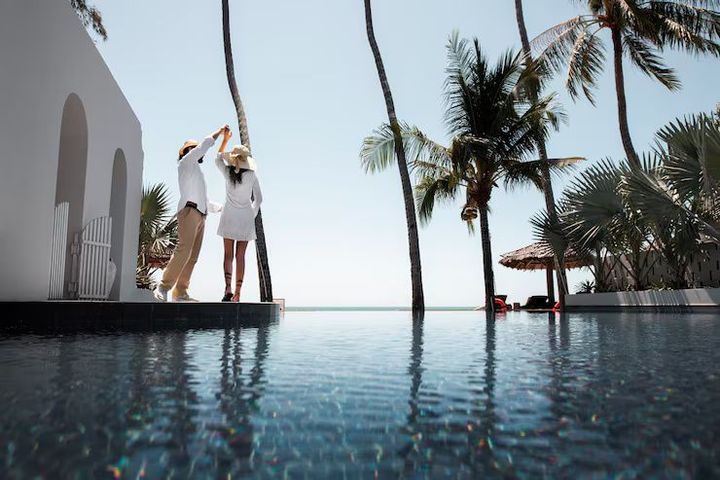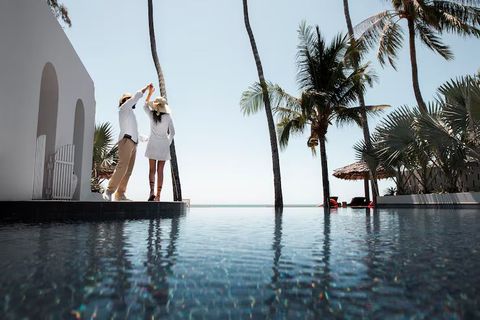
Guide to Luxury Hotel Booking in Maldives: Advanced Tips, Insights & Travel Analysis
Luxury hotel booking in the Maldives has become a major focus for international travellers seeking privacy, comfort, and serene natural surroundings. The Maldives, an island nation in the Indian Ocean, is known for overwater villas, white-sand beaches, and marine biodiversity. As global travel becomes more experience-driven, luxury accommodations have gained attention due to their design, services, environmental practices, and immersive experiences.
Over the past decade, luxury travel in the Maldives has evolved from simple beachfront stays to highly curated experiences such as underwater suites, ocean-view residences, and eco-focused retreats. This shift has encouraged travellers to explore booking processes more carefully, comparing amenities, sustainability standards, island accessibility, and guest-experience factors.
Luxury hotel booking today involves evaluating transportation options, island classifications, resort-only islands, and integrated hospitality technology. Travellers look for clarity in booking procedures, stay features, privacy levels, and wellness-oriented environments.

Importance
Understanding luxury hotel booking in the Maldives matters because it influences travel planning, budget distribution, stay quality, and overall experience. High-end accommodations in island nations differ significantly from typical urban hotels due to their remote locations, unique ecosystems, and transport requirements.
This topic affects travellers who prefer:
-
Private islands and low-crowd environments
-
High-comfort beach resorts or overwater accommodations
-
Marine activities such as diving, snorkeling, and ocean excursions
-
Wellness retreats focusing on relaxation and rejuvenation
-
Long-stay travel for special occasions or holiday seasons
Clear knowledge about booking processes helps travellers resolve common challenges such as:
-
Selecting the right island based on distance from Malé
-
Understanding seaplane or speedboat transfer timelines
-
Identifying resorts that match expectations for privacy and facilities
-
Learning how seasonal weather impacts travel schedules
-
Recognizing policies related to environmental conservation
Informed booking decisions can lead to smoother travel planning and a more enriching stay.
Recent Updates
Luxury hospitality in the Maldives has seen several developments in the last year:
2024–2025 Travel Trends
-
Increased interest in sustainable stays and resorts using renewable energy or reef-protection initiatives.
-
Growth in digital-first travel planning, including virtual room tours and island previews.
-
Expansion of wellness programs, with many resorts introducing new spa concepts, sleep therapy, sound healing, and ocean-based relaxation techniques.
-
Rising popularity of family-friendly luxury stays, with kids’ clubs, water parks, and multi-bedroom villas launched across multiple islands.
-
More resorts adopting AI-powered guest service systems to enhance communication and personalization.
2024 Climate & Weather Insights
-
Weather data from 2024 indicates slightly increased rainfall during June–August due to monsoon shifts, influencing travel planning and preferred booking months.
-
Dry season (December to March) continues to be the most stable period for outdoor activities and clear-water visibility.
New Resorts Launched in 2024–2025
Luxury openings introduced more design innovations such as split-level overwater villas, floating spas, and coral-restoration programs. These additions expanded choices for travellers seeking unique architectural experiences.
Laws or Policies
Luxury hotel booking in the Maldives is influenced by hospitality, tourism, and environmental rules set by the Maldives government.
-
Tourist Visa Policy
Most visitors receive a 30-day tourist visa on arrival. However, travellers should ensure valid travel documentation and confirm regional entry requirements. -
Island Resort Regulation
Resorts operate on leased islands and must follow regulations for infrastructure, waste management, and marine conservation. Environmental Impact Assessments (EIA) are required for major developments. -
Green Tax Policy
The Maldives charges a Green Tax on tourist stays at registered properties. This fee supports environmental protection programs across the islands. -
Transport Safety Regulations
Seaplanes and speedboats operating around the islands must comply with aviation and maritime safety rules governed by national authorities. -
Cultural Considerations
While resort islands function independently, travellers passing through local inhabited islands must follow local customs, including modest dressing and cultural etiquette.
Understanding these policies ensures smoother travel planning and helps visitors align their stay with national regulations.
Tools and Resources
Travellers can use a combination of digital tools and official resources to plan luxury hotel booking in the Maldives effectively.
Travel & Booking Platforms
-
Official Maldives Tourism Website – for verified island and resort information
-
Global hotel comparison tools – for comparing ratings, amenities, and stay insights
-
Resort virtual tour websites – offering high-resolution walkthroughs of villas and facilities
Climate & Weather Tools
-
Maldives Meteorological Service portal
-
Monthly climate pattern trackers
-
Ocean current and tide monitoring apps
Transportation Information
-
Seaplane schedule lookup tools
-
Speedboat route checkers provided by resorts
-
Travel time calculators from Malé International Airport
Mapping & Planning Resources
-
Island-location maps
-
Aerial landscape guides
-
Marine-life and coral-reef maps
Sustainability Trackers
-
Resort environmental certifications
-
Ocean-protection program listings
-
Eco-friendly travel guideline sites
These resources help travellers assess resort quality, environmental standards, and logistical requirements before making a booking decision.
Key Insights for Luxury Hotel Booking in the Maldives
Choose the Right Island Category
The Maldives has various island types:
-
Private resort islands – best for privacy
-
Atoll-based islands – ideal for diving and marine life
-
Near-airport islands – convenient for short trips
-
Remote islands – suited for tranquil stays
Understand Transfer Requirements
Luxury resorts may require:
-
Seaplane transfers (daytime only)
-
Domestic flights plus speedboat transfers
-
Direct speedboats for islands close to Malé
Transfer schedules can influence arrival and departure planning.
Evaluate Resort Layout and Privacy Levels
Travellers should check:
-
Overwater villa spacing
-
Beachfront orientation
-
Lagoon vs ocean-side placement
-
Noise levels and activity zones
Check Lagoon Quality and Marine Life
Clear lagoons are preferred for snorkeling and water activities. Coral conditions vary across islands due to natural changes and conservation efforts.
Study Weather Patterns Before Booking
Dry months offer stable conditions, while monsoon seasons can limit visibility and sea travel.
Comparison Table: Island Accessibility & Stay Characteristics
| Feature | Near Malé Islands | Remote Islands | Private Resort Islands |
|---|---|---|---|
| Transfer Time | Short | Moderate to long | Depends on location |
| Privacy Level | Moderate | High | Very High |
| Marine Life | Good | Excellent | Varies |
| Travel Ease | High | Medium | High |
| Stay Experience | Convenient | Immersive | Exclusive |
1. What is the best time to plan a luxury stay in the Maldives?
The most stable period is generally between December and March, when dry weather and calm seas support outdoor activities and clear-water visibility.
2. Are seaplane transfers mandatory for all luxury resorts?
Not always. Some resorts offer speedboat transfers from Malé, while others require domestic flights followed by a short boat ride. Transfer mode depends on the island’s location.
3. How do travellers evaluate marine-life quality around a resort?
Many resorts publish information about reef conditions. Travellers can also refer to marine-life maps, ocean-visibility trackers, and reviews focusing on snorkeling zones.
4. Are Maldives luxury resorts suitable for families?
Yes. Many luxury properties now offer family-friendly villas, activity clubs, and safe lagoon areas. It is advisable to verify facilities in advance.
5. How do environmental rules affect luxury hotels?
Resorts must follow national guidelines for waste management, reef protection, and energy usage. Some properties adopt eco-certifications to show their sustainability standards.
Conclusion
Luxury hotel booking in the Maldives involves evaluating location, amenities, island characteristics, environmental practices, transportation logistics, and weather conditions. Understanding recent trends, regulatory considerations, and planning resources can help travellers make informed decisions about their stay.
The Maldives continues to attract visitors seeking privacy, nature-driven relaxation, and high-quality hospitality. A clear, structured approach to booking enhances the experience and ensures that the trip aligns with personal preferences, travel patterns, and sustainability values.






